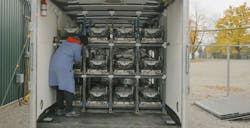Long Duration Energy Storage Council Bringing Expertise to Solve Island Power Imbalance
Solving the energy crisis hanging over the world’s inhabited islands will take a combination of resources blended together to smooth out the shift away from inefficient, non-local fuels.
The global non-profit Long Duration Energy Storage Council is working with Italian-based Greening the Islands (GTI) Foundation to partner on promoting long-duration technologies for helping islands transition to fully renewable energy systems worldwide.
LDES is composed of multiple energy storage companies and research groups vying for alternatives to the currently dominant lithium-ion battery chemistry, which has strong energy density but shorter cycles and greater fire risks. Such long duration energy storage technologies include thermal storage, mechanical storage and electrochemical storage such as flow batteries, iron air batteries, zinc-based and metal anode versions.
The collaboration between LDES Council and the GTI Foundation will focus on knowledge sharing, multi-stakeholder dialogue, and capacity building for 8-hour plus storage solutions. The two organizations signed a memorandum of understanding (MoU) to formalize their cooperation at the Global Renewable Alliance (GRA) Lisbon Future Dialogue in June.
"The partnership between the LDES Council and the Greening the Islands Foundation presents a transformative opportunity to scale long duration energy storage solutions in island communities,” Julia Souder, CEO of the Long Duration Energy Storage Council, said in a statement. “By aligning our efforts, we are not only opening new markets for LDES deployment but also driving forward policy innovation and showcasing how islands can become global frontrunners in resilient, net-zero energy systems.”
Many of the world’s most inhabited or destination islands face rising energy demand without the home-based resources to meet that load. Traditionally, those islands have relied on imported diesel generation, with the fuel shipped in from elsewhere and creating greenhouse gas emissions, or delivery of other combustible fuels. Leadership on many islands also are pursuing on-site power hybrid installations such as microgrids.
Many island governments are seeking solar installations with battery storage to balance out the intermittencies of solar and wind. The LDES-GTI agreement will focus on a shared commitment to leveraging the potential of long-duration energy storage technologies for successful transitions towards 100% renewable energy and the sustainable development of islands worldwide.
“To achieve 100% renewable energy, the building block of the island model we aim to support and replicate for broad decarbonization and sustainability, renewables plus storage and smart grids must go hand in hand,” said Gianni Chianetta, Chair of GTI Foundation. “Through the partnership with LDES Council, we will showcase how long duration energy is the game-changer for energy security and resilience, especially for non-interconnected islands with tourism-driven fluctuating power demand.”
As per the terms of the MoU, the LDES Council will support technical expertise, resources, and long duration energy storage awareness for the GTI Foundation’s 100% RES Islands Initiative, including developing technical case studies and contributing to capacity-building programs. GTI will provide a platform for advocacy and enhanced visibility, including event engagements and collaborative publications designed to improve LDES technologies and policies.
Among the equipment companies which support and participate in the Long Duration Energy Storage Council are CellCube, Energy Vault, EOS, ESS, Hydrostor, Ice Energy, Sumitomo Electric, XL Batteries and TechnipFMC, among others. Commercial and industrial energy customers which are members in support of the LDES include Amazon Web Services, bp, ExxonMobil, Google, Microsoft, Orsted, RioTinto, Shell, TotalEnergies and Vopark.
Greening the Islands Foundation has partnerships with advocacy groups such as Blue Planet Alliance, Global Renewables Alliance, Global Solar Council and Local 2030 Islands Network. The GTI staff includes experts on air quality, water, energy and engineering, smart grids, biodiversity and waste.
The Global Battery Storage Race is On
Read more with this free EnergyTech E-Book
About the Author
Rod Walton, EnergyTech Managing Editor
Managing Editor
For EnergyTech editorial inquiries, please contact Managing Editor Rod Walton at [email protected].
Rod Walton has spent 17 years covering the energy industry as a newspaper and trade journalist. He formerly was energy writer and business editor at the Tulsa World. Later, he spent six years covering the electricity power sector for Pennwell and Clarion Events. He joined Endeavor and EnergyTech in November 2021.
Walton earned his Bachelors degree in journalism from the University of Oklahoma. His career stops include the Moore American, Bartlesville Examiner-Enterprise, Wagoner Tribune and Tulsa World.
EnergyTech is focused on the mission critical and large-scale energy users and their sustainability and resiliency goals. These include the commercial and industrial sectors, as well as the military, universities, data centers and microgrids. The C&I sectors together account for close to 30 percent of greenhouse gas emissions in the U.S.
He was named Managing Editor for Microgrid Knowledge and EnergyTech starting July 1, 2023
Many large-scale energy users such as Fortune 500 companies, and mission-critical users such as military bases, universities, healthcare facilities, public safety and data centers, shifting their energy priorities to reach net-zero carbon goals within the coming decades. These include plans for renewable energy power purchase agreements, but also on-site resiliency projects such as microgrids, combined heat and power, rooftop solar, energy storage, digitalization and building efficiency upgrades.



